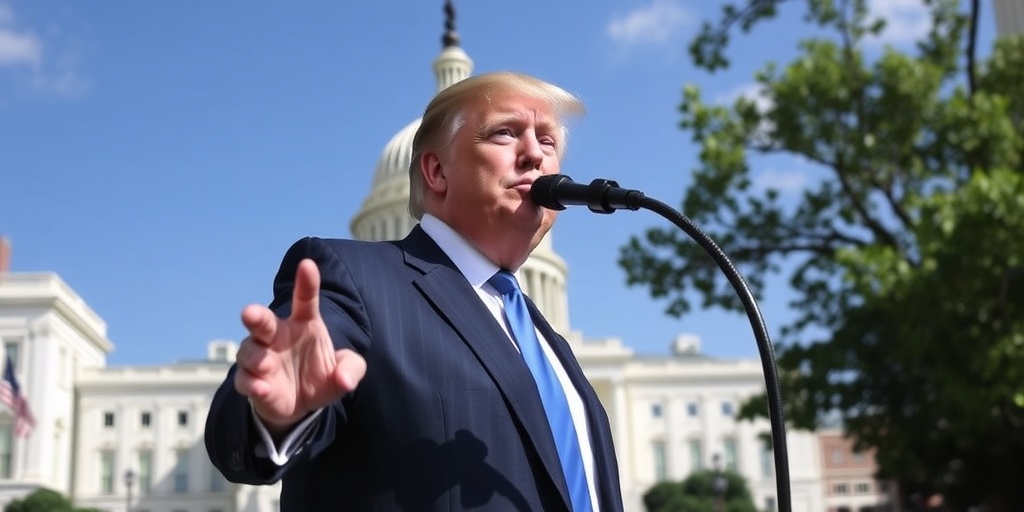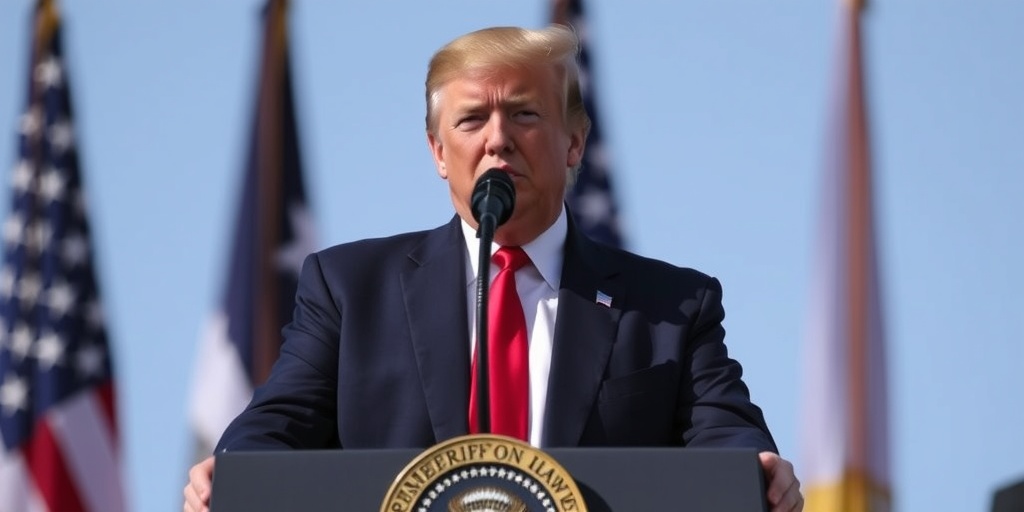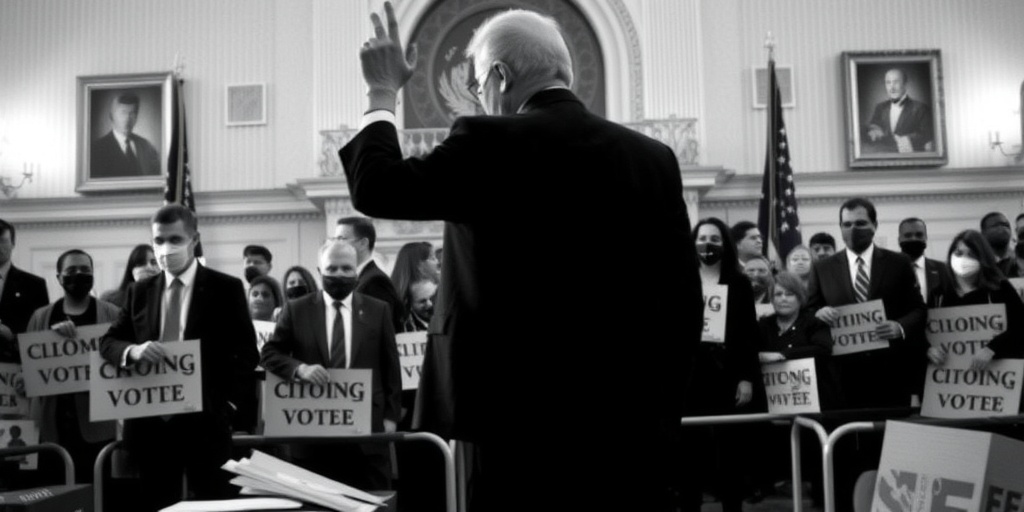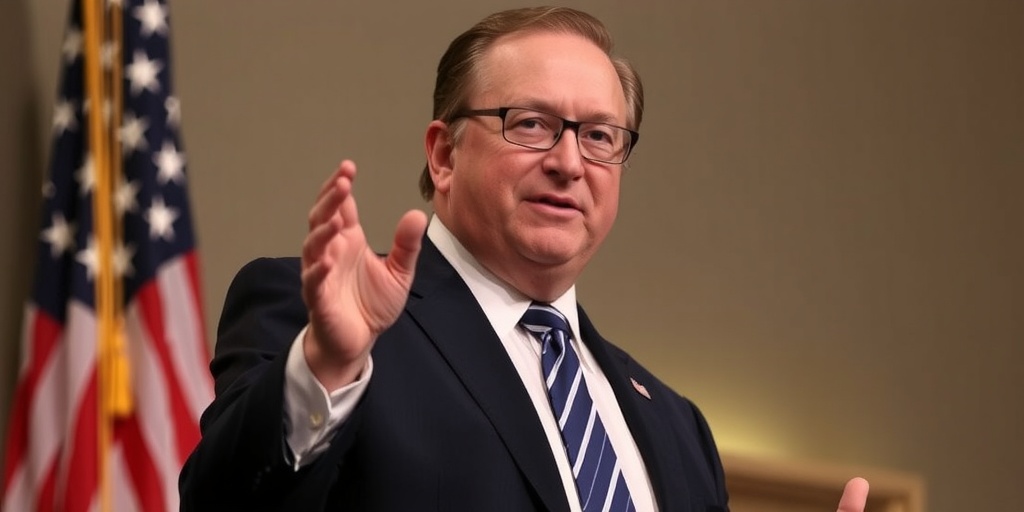Now Reading: House Republicans Block Vote on Trump Tariff Repeal
-
01
House Republicans Block Vote on Trump Tariff Repeal
House Republicans Block Vote on Trump Tariff Repeal

House Republicans Strategically Sideline Tariff Votes Amid Political Pressure
On Wednesday, House Republican leaders took decisive steps to shield their members from a potentially perilous vote regarding President Trump’s recently imposed tariffs. By cleverly integrating related provisions into an unrelated measure, they aimed to temporarily prevent lawmakers from exercising their authority to compel a vote on the tariffs in the forthcoming months. This procedural tactic, which is relatively uncommon, represents a calculated move by the party as they navigate the turbulent political landscape that Trump’s trade policies have exacerbated.
This recent maneuver marks the second occasion in which Republicans have employed this unconventional strategy to circumvent congressional oversight on trade matters. Increasingly anxious feedback from constituents and financial backers has surfaced, highlighting concerns over the negative ramifications of Trump’s trade initiatives. Just last month, Republicans had similarly inserted language into a separate measure related to a spending bill intended to avert a government shutdown, creating a precedent that they followed again on Wednesday.
The situation became even more urgent as Republicans injected language into a measure connected to their budget plan, which was scheduled for vote later that day. This tactic effectively limits the ability of lawmakers from both parties who have sponsored bills aimed at terminating Trump’s tariffs from bringing their proposals to the House floor for a proper discussion and vote.
The National Emergencies Act typically allows Congress members to prompt discussions and votes on such measures within a constrained timeframe—specifically, through committee consideration within 15 days, followed by a floor vote within three days. However, the language inserted by GOP leaders would declare the approximate six-month interval leading up to September 30 as a single calendar day, bypassing the normal legislative timeline altogether.
Speaker of the House Mike Johnson addressed reporters, asserting that this maneuver preserves a "suitable level of authority" for Congress to address unfair trade practices. He emphasized the importance of the presidential role in negotiations, stating, "The role of the president is to negotiate with other countries and other heads of state. And he’s doing that."
Notably, just hours before these developments, President Trump announced a temporary pause on most of the reciprocal tariffs he had unveiled the prior week, with an intent to hold these measures in abeyance for a period of 90 days. Despite this, the insertion of the language into the GOP budget plan underlined the persistent anxiety surrounding the tariffs and their potential impact on both Republican lawmakers and their electoral prospects.
The Senate recently passed a measure invoking the National Emergencies Act, aimed at rescinding the tariffs that had been levied on Canada earlier in February. Lawmakers from both sides of the aisle have also introduced bipartisan measures seeking to terminate the new tariffs introduced by Trump last week. However, the maneuver adopted by House Republicans aims to effectively quash these legislative attempts, at least in the short term.
Democrats were swift to condemn the GOP’s actions as a significant erosion of congressional authority concerning tariffs. Representative Suzan DelBene, a Democrat from Washington, voiced her disapproval during a hearing held on Wednesday, stating, "Republicans are already putting in a provision to make sure that they don’t have to vote on the tariffs that are in place. Congress should have a role here. It’s terrible that my colleagues on the other side aren’t willing to have a vote."
The ongoing conflict surrounding tariffs has sparked intense debates, revealing the divide within Congress over trade policy and the balance of power between the legislative and executive branches. As Republicans grapple with the fallout from Trump’s tariffs, the question remains as to how long they can continue to navigate the political ramifications without direct legislative input on such contentious issues.
The current environment in Congress reflects heightened sensitivities toward trade matters, with lawmakers responding to public outcry and potential backlash from their voter base. Both parties recognize that tariffs impact not only economic relationships with other countries but also have direct consequences for American consumers and businesses.
As Congress proceeds with its agenda, the ramifications of these strategic decisions will likely resurface, forcing legislators to confront the challenges posed by trade policy and the broader implications of their actions on the economy and international relations. With the GOP’s recent maneuvers to protect their members from politically sensitive votes, the battle over tariffs in Congress is far from over, setting the stage for continual political maneuvering in the months ahead.
Stay Informed With the Latest & Most Important News
Previous Post
Next Post
-
 01New technology breakthrough has everyone talking right now
01New technology breakthrough has everyone talking right now -
 02Unbelievable life hack everyone needs to try today
02Unbelievable life hack everyone needs to try today -
 03Fascinating discovery found buried deep beneath the ocean
03Fascinating discovery found buried deep beneath the ocean -
 04Man invents genius device that solves everyday problems
04Man invents genius device that solves everyday problems -
 05Shocking discovery that changes what we know forever
05Shocking discovery that changes what we know forever -
 06Internet goes wild over celebrity’s unexpected fashion choice
06Internet goes wild over celebrity’s unexpected fashion choice -
 07Rare animal sighting stuns scientists and wildlife lovers
07Rare animal sighting stuns scientists and wildlife lovers





















